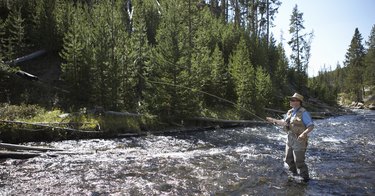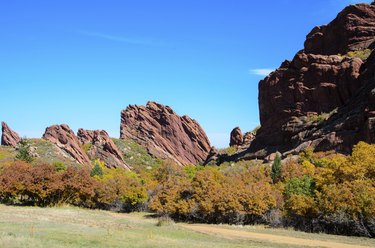how to become a park ranger

Park ranger hat.
Image Credit: Jami Garrison/iStock/Getty Images
Whether employed by states or the federal government, park rangers can claim some of the most beautiful parts of the United States as their workplaces. They live and work in places other people visit on vacation, and spend much of their time outdoors, interacting with vacationers and local wildlife. As a park ranger, your closest neighbors might be grizzly bears or mountain lions, and your commute to the office might involve a hike down a scenic trail.
Duties

Yellowstone National Park.
Image Credit: Stewart Sutton/Digital Vision/Getty Images
Though park rangers serve as hosts to the visitors who come to state and national parks, their primary duty is stewardship of the natural resources in the park. Thus, rangers enforce rules designed to protect those resources, such as "do not feed the bears." They try to keep wildlife and people from interacting too closely, watch for and fight forest fires, combat litter, monitor traffic in parks. They also serve as law enforcement officers within park lands, with the authority to issue citations and investigate crimes. They also engage in a number of mundane duties, from answering tourist's questions, conducting tours, selling firewood and even cleaning latrines. A ranger's duties depend on her location and seniority. Park rangers may be full time, part time or seasonal.
National Park Rangers

Money in hand.
Image Credit: George Doyle/Stockbyte/Getty Images
National park rangers can hold a variety of positions and ranks. The most junior rangers are summer rangers, seasonal positions that require them to work three or four months during the summer only. These rangers start at a pay grade of GS-4, or $18,687 as of 2006. Full-time, permanent rangers hold a salary ranging from GS-5 to GS-9, or between $20,908 and $31,680. Rangers with higher-level education and more experience earn the highest salaries.
State Park Rangers

State Park in Colorado.
Image Credit: Yobab/iStock/Getty Images
Each state hires its own park rangers to work in state parks. Salaries vary from state to state. For example, in Virginia most park rangers are designated as either natural resource specialist I or II. A natural resource specialist I is classified as Pay Band 3, with a 2011 salary range of $23,999 to $49,255. Natural resource specialist II is a Pay Band 4 position, with a 2011 salary range of $31,352 to $64,247. In California, positions range from a state park ranger cadet to a state park ranger supervisor. A cadet earns between $3,211 and $4,187 per month, while a supervisor can earn between $4,590 and $6,078 monthly as of 2011.
Educational Requirements

College degree.
Image Credit: Jeffrey Hamilton/Photodisc/Getty Images
Requirements to be a park ranger depend upon the location and job classification. The National Park Service prefers candidates with undergraduate or graduate-level degrees in natural resource management, history, earth sciences, archeology, park and recreation management, anthropology, business administration or law enforcement. Specialized work experience in business administration, fish and wildlife management, parks management or other pertinent fields will also help you compete for these park ranger positions. In California, all applicants must have completed at least two years at a state-accredited college or university, with courses in natural sciences, languages, humanities and mathematics. Above the level of cadet, park rangers must graduate from a Peace Officer Standards and Training academy and be certified in first aid and CPR. In Virginia, you'll need a high school diploma, a valid driver's license and certification in CPR and first aid to apply as a park ranger. Law enforcement training is a plus, but not required.
how to become a park ranger
Source: https://www.sapling.com/8529904/much-do-park-rangers-paid
Posted by: doylecriall97.blogspot.com

0 Response to "how to become a park ranger"
Post a Comment